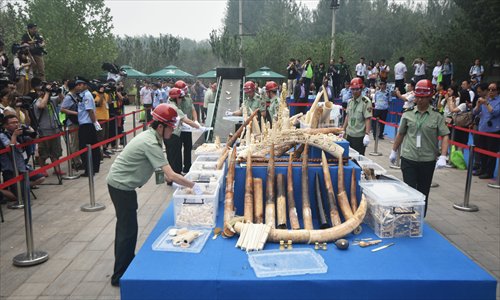HOME >> CHINA
White gold
Source:Global Times Published: 2015-10-25 21:08:01
Chinese 'Ivory Queen' faces trial for smuggling in Tanzania

Ivory items and carvings are displayed during a destruction ceremony at Beijing's wildlife rescue and rehabilitation center on May 29. As much as 660 kilograms of ivory siezed since 2014 have been crushed by the authorities. Photo: IC
The case of the Chinese businesswoman who allegedly helped smuggle ivory out of Tanzania and was dubbed the "Ivory Queen" has attracted huge media attention recently, but her lawyer and family maintain her innocence.Yang Fenglan, 66, and two local men were charged with smuggling 706 pieces of ivory products between 2000 and 2004 worth 5.44 billion Tanzanian shillings ($2.51 million), according to Reuters.
If found guilty she faces up to 30 years behind bars.
In court documents seen by Reuters, prosecutors said Yang "intentionally did organize, manage and finance a criminal racket by collecting, transporting or exporting and selling government trophies."
Competing claims
The Elephant Action League, a US-based conservation group, said that it believed Yang to be "the most notorious ivory trafficker brought to task so far."
"Hopefully she can lead us to other major traffickers and corrupt government officials. We must put an end to the time of the untouchables if we want to save the elephant," the group's founder Andrea Crosta said in a statement
But Yang's lawyer Nehemia Mkoko argued that she is innocent of all charges.
Shi Tiefeng, an official from the Chinese Embassy in Tanzania said Yang faced three trials at the local Intermediate Court in October but the prosecution has failed to provide sufficient evidence to convict her.
The case will be heard by the local High Court on Monday and Mkoko said he is optimistic.
Yang was arrested by Tanzanian police on September 27 on suspicion of smuggling and she was investigated by Interpol for more than a year, however the police and Interpol found no ivory after raiding Yang's company, farms and residence.
Ding Xian, chairman of the China-Africa Business Council of Tanzania, an organization of which Yang was once vice-president, said that Yang was arrested based on testimony given by one of her employees who was arrested for smuggling ivory in 2013.
Ding said Yang asked the employee to drive her vehicle to refuel it but instead the employee made use of the opportunity to smuggle ivory in the car.
Yang's daughter Du Fei said that the employee seemed to be an honest person when Yang employed him to work with the company but she said that he began to lie at work, which shows that he is not a reliable witness.
However, CNN reported Tanzanian authorities as saying that Yang ran a sophisticated supply chain between East Africa and China for a decade.
The Elephant Action League said that Yang had worked with "high-ranking poachers in the country and in the region," was "connected to various companies abroad, all Chinese-owned" and was well-known in the "upper echelons of Chinese citizens living and working in Tanzania."
Carving ban
East Africa's elephant population shrank from 110,000 in 2009 to little more than 43,000 in 2014, according to a census released in June, with conservation groups blaming "industrial-scale" poaching, Reuters reported.
The Convention on International Trade in Endangered Species of Wild Fauna and Flora, an international treaty between governments, allowed China a one-off exemption in 2008 to import 62 tons of ivory from several African nations.
China has also been strictly following related agreements, opposing poaching and smuggling, experts said. On October 15, the government announced a one-year ban on the import of ivory carvings to further curb illegal smuggling.
But a report from WildAid, an NGO that fights the illegal wildlife trade, claimed that as much as 70 percent of illegal ivory goes to China. The report quoted an investigation which found many Chinese ivory businesses ignoring the ban, with unlicensed and non-compliant firms outnumbering legal ones nearly six to one.
Posted in: Society